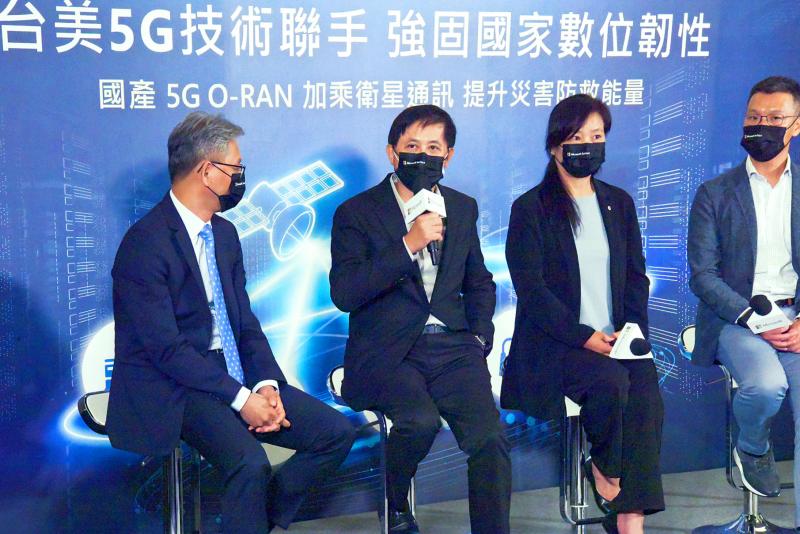iPhone assembly operations in China are beginning to reduce their energy consumption because of a sudden power crunch in the country, which has triggered government-imposed curbs on a range of businesses.
Pegatron Corp (和碩), a key partner for Apple Inc and one of the assemblers of its iPhone, said yesterday that it’s taking energy-saving measures to comply with local government policies.
Regardless, the firms responsible for producing the Apple handset have avoided drastic cutbacks in production so far and appear to be getting preferential access to energy in order to keep operations going, people familiar with the situation said.

Photo courtesy of Pegatron Corp via CNA
Pegatron’s iPhone facility in the eastern city of Kunshan will be only modestly affected, two of the sources said, asking not to be named because the information is not public.
There has been no major impact on the nearby Luxshare Precision Industry Co (立訊精密) iPhone assembly unit, and the company continues to ready key products for shipment in line with its original schedule, one of the people said.
Curbs on industrial energy use have been imposed across several provinces, including economic powerhouses Jiangsu and Guangdong, as Chinese officials pursue Chinese President Xi Jinping’s (習近平) carbon-neutral push and react to escalating coal and gas prices.
The continued operations of Apple suppliers suggest that Beijing might be giving exceptions to the advanced manufacturing sector from its power sanctions.
Pegatron’s iPhone production facility in Shanghai and Hon Hai Precision Industry Co’s (鴻海精密) key Apple handset manufacturing base in Zhengzhou — known as iPhone City — have continued uninterrupted, several of the sources said.
Pegatron has been adopting measures to save water and energy over the past few years, “and there is a comprehensive response program for the current situation to reduce the impact on our operations and production capacity,” the company said in a texted statement.
While the iPhone supply chain appears resilient for now, executives at major Apple suppliers are closely monitoring developments, according to the sources.
Exports remain a key growth driver for China, with Hon Hai and other tech hardware manufacturers being the country’s top exporters and among its biggest employers.

NEW IDENTITY: Known for its software, India has expanded into hardware, with its semiconductor industry growing from US$38bn in 2023 to US$45bn to US$50bn India on Saturday inaugurated its first semiconductor assembly and test facility, a milestone in the government’s push to reduce dependence on foreign chipmakers and stake a claim in a sector dominated by China. Indian Prime Minister Narendra Modi opened US firm Micron Technology Inc’s semiconductor assembly, test and packaging unit in his home state of Gujarat, hailing the “dawn of a new era” for India’s technology ambitions. “When young Indians look back in the future, they will see this decade as the turning point in our tech future,” Modi told the event, which was broadcast on his YouTube channel. The plant would convert

‘SEISMIC SHIFT’: The researcher forecast there would be about 1.1 billion mobile shipments this year, down from 1.26 billion the prior year and erasing years of gains The global smartphone market is expected to contract 12.9 percent this year due to the unprecedented memorychip shortage, marking “a crisis like no other,” researcher International Data Corp (IDC) said. The new forecast, a dramatic revision down from earlier estimates, gives the latest accounting of the ongoing memory crunch that is affecting every corner of the electronics industry. The demand for advanced memory to power artificial intelligence (AI) tasks has drained global supply until well into next year and jeopardizes the business model of many smartphone makers. IDC forecast about 1.1 billion mobile shipments this year, down from 1.26 billion the prior

People stand in a Pokemon store in Tokyo on Thursday. One of the world highest-grossing franchises is celebrated its 30th anniversary yesterday.

Zimbabwe’s ban on raw lithium exports is forcing Chinese miners to rethink their strategy, speeding up plans to process the metal locally instead of shipping it to China’s vast rechargeable battery industry. The country is Africa’s largest lithium producer and has one of the world’s largest reserves, according to the US Geological Survey (USGS). Zimbabwe already banned the export of lithium ore in 2022 and last year announced it would halt exports of lithium concentrates from January next year. However, on Wednesday it imposed the ban with immediate effect, leaving unclear what the lithium mining sector would do in the